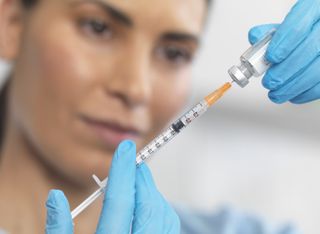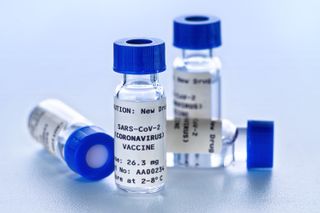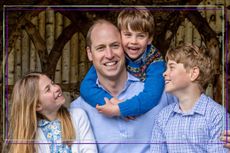How to become a volunteer for the coronavirus vaccine trials in the UK


In May, it was confirmed by Business Secretary Alok Sharma that the government was providing £84m in funding to accelerate the research into a coronavirus vaccine.
Since then, it’s been a race between Imperial College London and Oxford University, the two universities developing the vaccine in the UK, to be the first one to succeed and recruit volunteers for a coronavirus vaccine trail.
Following early human trials in May for Oxford University, with just over 1000 participants, it now appears as though the university has found that their vaccine trains the immune system to produce white blood cells and the antibodies needed for fighting coronavirus. Testing also revealed that the vaccine produced few side effects.
These results were made public this week in the medical journal Lancet, with scientists confirming that the vaccine produced a T-cell response within 14 days of vaccination and an antibody 28 days after.
Co-author of the Oxford University study, Professor Sarah Gilbert, confirmed that the findings were promising but said there “is still much work to be done before we can confirm if our vaccine will help manage the Covid-19 pandemic.”
This includes more research to confirm that the vaccine would be effective throughout the diverse population, regardless of age, pre-existing health conditions, ethnicity and geography.
Part of this work involves further trials to establish how long these T-cells will last within the human body, and therefore, the chances of offering immunity to Covid-19 for the whole population.
GoodtoKnow Newsletter
Parenting advice, hot topics, best buys and family finance tips delivered straight to your inbox.
So, how can you volunteer for coronavirus vaccine trails in the UK? Is it safe? Plus everything else you need to know about becoming a volunteer in the Covid-19 vaccine trials.
How to volunteer for coronavirus vaccine trails in the UK
Both the Imperial College and Oxford University studies are looking for more volunteers across England, Scotland and Wales. You can easily sign up online to take part in the trials through the NHS, giving permission for researchers to contact you if they think you’re a good fit.
Once you sign up, you can withdraw at any time and request that your details be removed from the COVID-19 vaccine research registry.
The process takes about 5 minutes to complete, according to the NHS website.
Alternatively, you can sign up to the trials separately online following a online pre-screening. This means you can choose which study, Imperial College London or Oxford University, you want to contribute to.
Who can sign up to volunteer for the coronavirus vaccine trials in the UK?

When you sign up to be contacted for the vaccine trials, you are simply letting the researchers know that you’re happy for them to contact you – rather than actually signing up for particular trial. However, there are some criteria that you have to meet to volunteer for coronavirus vaccine trails.
To volunteer for coronavirus vaccine trails you need to:
- Having an active email address, so you can be contacted.
- Being over 18 years of age.
- Residence in the UK.
- Not previously tested positive for Covid-19.
- Not being pregnant or breastfeeding during the trial dates.
- Not previously taken part in a coronavirus vaccine trial.
However, the Oxford University trial is particularly looking for those who will likely have a high exposure to Covid-19. These include: People working in Covid-19 patient facing healthcare roles, such as those in the ICU, A&E, Covid-19 wards, Parademics, Care Home covers, dentists, and those working in GP Covid-19 hubs and testing centres).
They are also looking for non-healthcare workers in Covid-19 hospital clinical areas, such as porters, receptionists and cleaners, as well as other public facing key workers who aren't supplied with PPE.
Who is running the Covid-19 vaccine trials?
While Oxford University and Imperial College London have the only two approved studies into the vaccine in the UK, it is actually the National Institute for Health Research (NIHR) who are running the coronavirus vaccine trials.
NIHR are the research partner to the NHS. It is researchers from studies approved by this institution that will be in contact, if volunteers are a good fit for one of the trials. This means that when you sign up, you can be contacted about either of the vaccine trials.
How do vaccine trials work?

To ensure that a vaccine is safe to give to the public, it needs to be tested first. If you take part in the trial, there’s no guarantee that you will actually be given the vaccine as you might be given a placebo instead.
If you are successful in securing a place on the trial, you will likely need to visit the hospital or research centre occasionally over a six month or one year period.
During these visits you will often be given more information about the research study as it progresses, have the chance to ask any questions and be given blood tests.
Otherwise, outside of those visits, you’ll normally be asked to keep the research team informed about any symptoms you have. You also might be asked to take a nose swab and keep diary.
Is the Covid-19 vaccine trial safe for volunteers?
In order for the Covid-19 vaccine to reach human trials, there needed to be other stages to make sure they are both safe for use and effective.
When deciding whether to take part in vaccine trials, many people worry that the vaccine will give them the virus in the process. However the NIHR has confirmed, ‘The vaccines are designed so that they do not cause infection.
‘The information you are given about any study you are invited to take part in will explain what stage the vaccine is at and how it has already been tested. You can consider this information when deciding whether to take part.’
With this in mind, many people have already signed up to be one of the Covid-19 vaccine volunteers so there is no guarantee that if you sign up, you will be contacted.

Grace Walsh is a health and wellbeing writer, working across the subjects of family, relationships, and LGBT topics, as well as sleep and mental health. A digital journalist with over six years experience as a writer and editor for UK publications, Grace is currently Health Editor for womanandhome.com and has also worked with Cosmopolitan, Red, The i Paper, GoodtoKnow, and more. After graduating from the University of Warwick, she started her career writing about the complexities of sex and relationships, before combining personal hobbies with professional and writing about fitness.
-
 Who did Bluey have a baby with? Fan theories are running wild following the cartoon’s season 3 finale (our money is on Mackenzie)
Who did Bluey have a baby with? Fan theories are running wild following the cartoon’s season 3 finale (our money is on Mackenzie)The 'Surprise!’ episode has really done what it says on the tin - and many can’t get over the shock of Bluey having a baby
By Charlie Elizabeth Culverhouse Published
-
 Prince George, Charlotte and Louis are huge fans of this popular tinned food - and it’s not what you’d expect from the royals
Prince George, Charlotte and Louis are huge fans of this popular tinned food - and it’s not what you’d expect from the royalsRoyal meal times are more similar to the average family's than you might imagine
By Charlie Elizabeth Culverhouse Published